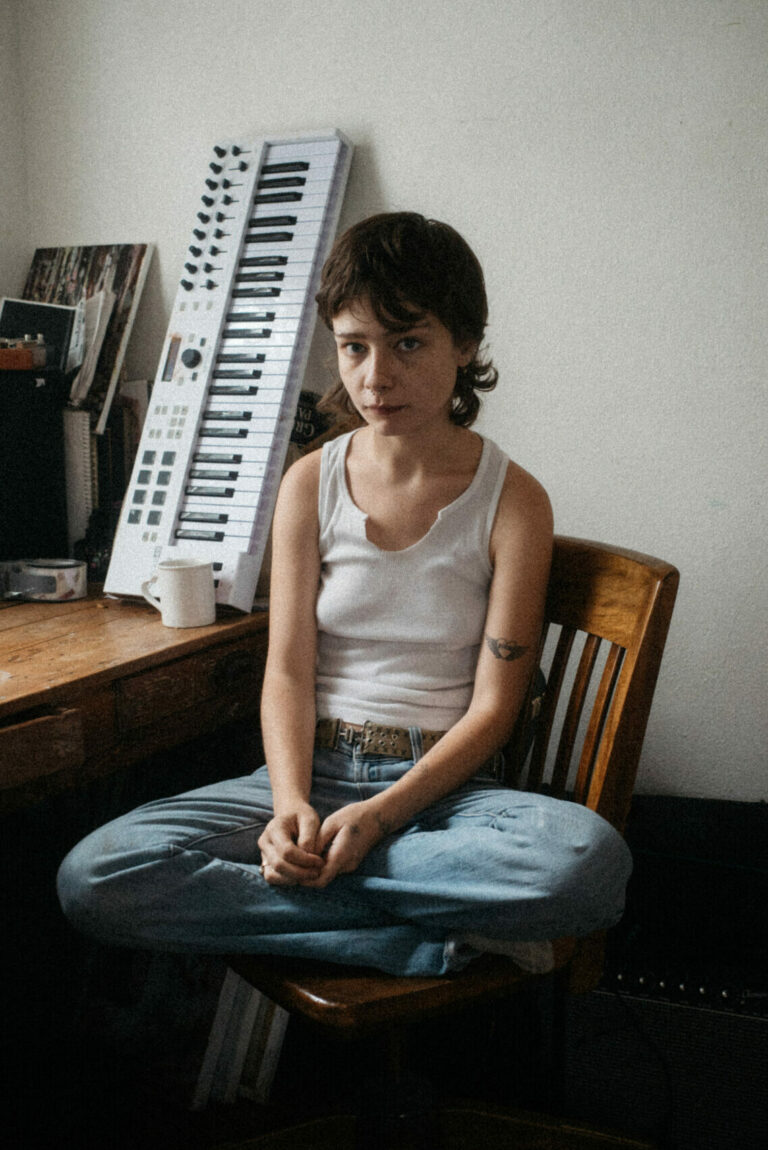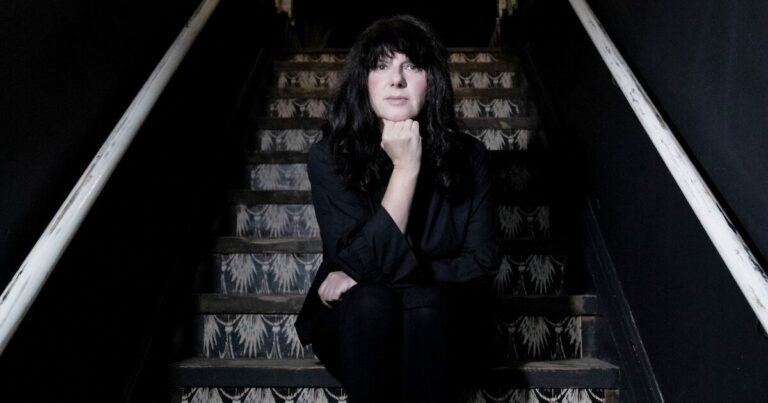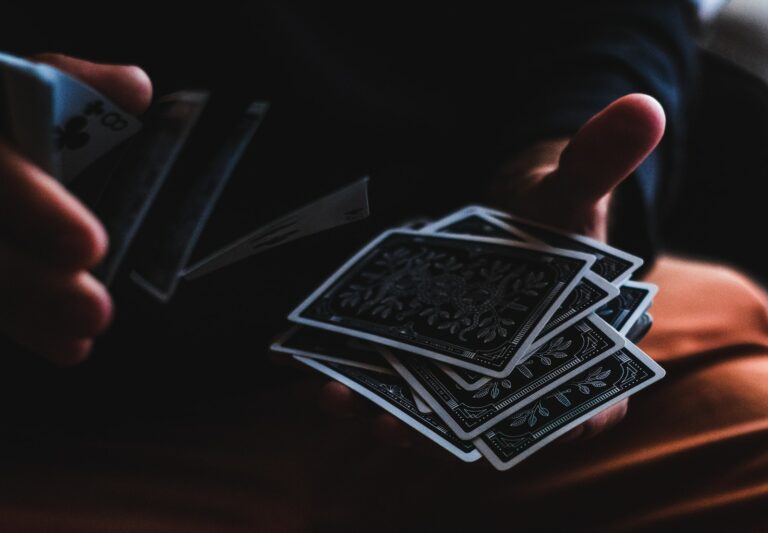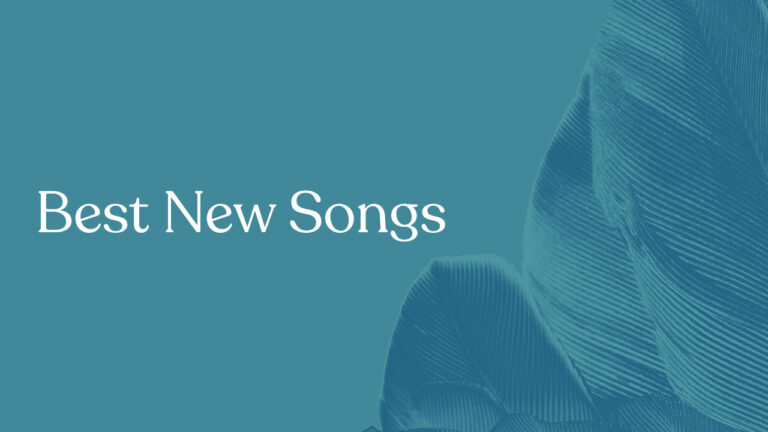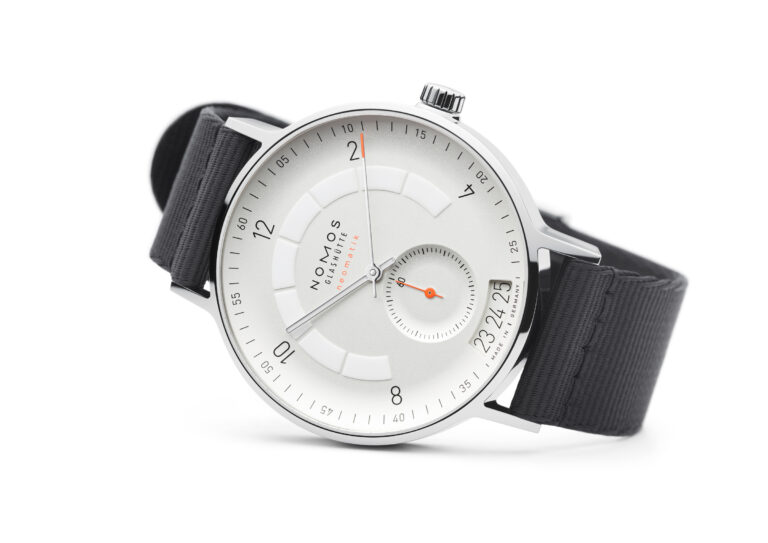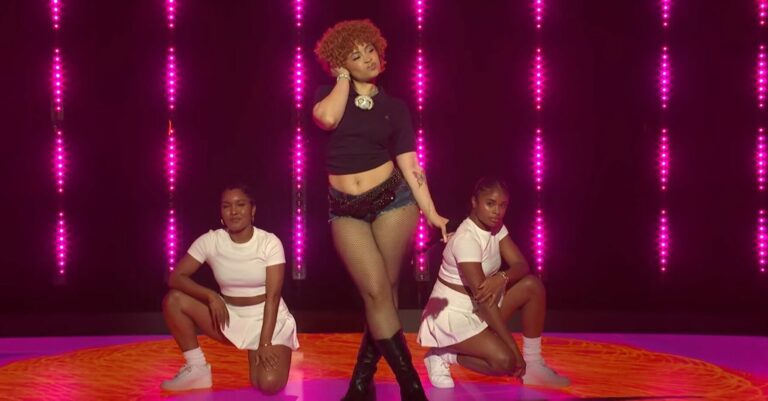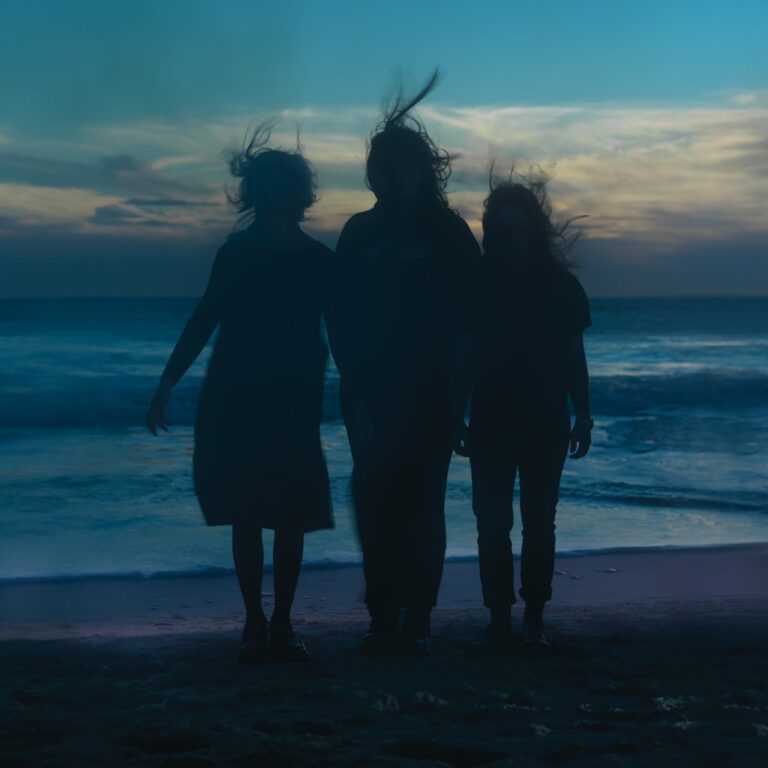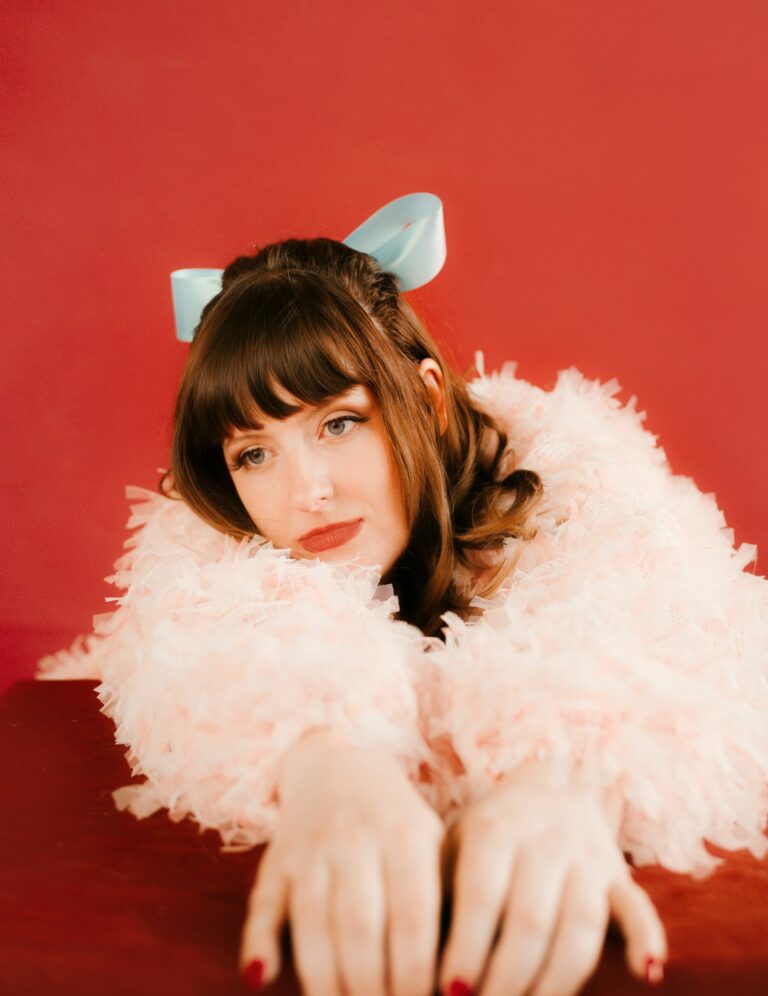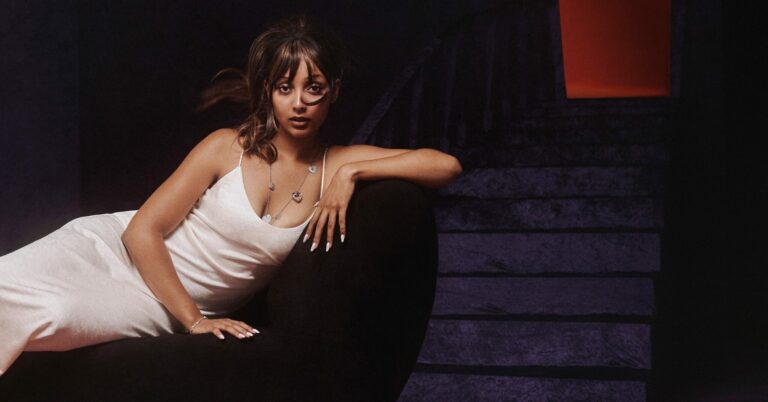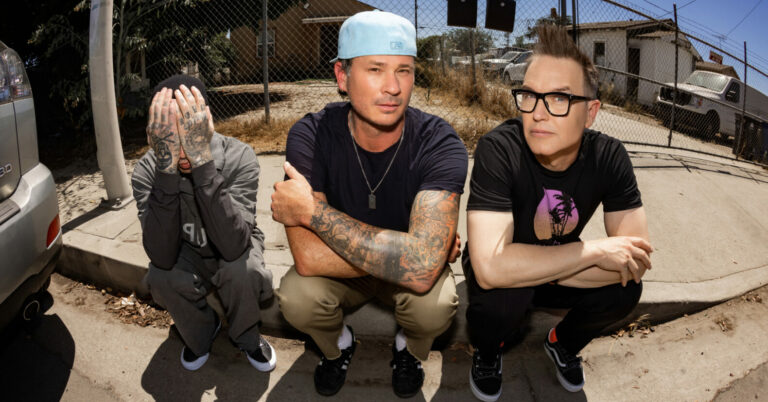Mali Velasquez is a singer-songwriter who grew up in Texas and is now based in Nashville, Tennessee. After posting a video of herself performing an early version of ‘Bobby’ – a song in which she lays down memories surrounding the loss of her mother when she was in high school – producer Josef “Jos” Kuhn reached out about recording the track, which led to them working together on her striking debut album, I’m Green, which came out on Friday. The subject matter of these songs is heavy yet delicate – “Laying over Mom/ No one seems to wonder how I carry on,” she sings on ‘Clovers’ – but as much as they revolve around grief, Velasquez is able to hold them with a kind of raw tenderness that leads her down new paths. Much of I’m Green rests on remembering a life that is lost or wavering at the edges, the way adulthood snaps at you in those fragile moments, but it also, in its organic beauty and vibrant arrangements, hints at the new life pushing her along. Whatever the meaning behind it is, Velasquez won’t spell it out but rather pour her heart into it, carrying it on.
We caught up with Mali Velasquez for the latest edition of our Artist Spotlight series to talk about her earliest musical memories, moving to Nashville, the making of I’m Green, and more.
Would you mind sharing some of your earliest memories of connecting to music?
Earliest memories probably go way, way back to me playing my dad’s drums in the basement and being probably like five. It was just super fun when I was a kid to just play around and pretend to know how to play the guitar when I was doing super silly stuff like that [laughs]. I started singing in church, and in middle school and high school I started writing songs in a more personal way than I had before. I think those were the days that I really liked started to connect in a more real way.
Was it clear at the time what gave it that personal weight? Were the challenges in learning to be comfortable with it?
I think when I found something that I wanted to start writing about that felt not super trivial to me, I felt a little more validated in doing it. I would just write a lot about my family, specifically my mom, and those things felt a little more important to say, to me at least. I think having something to say was huge for me. I think I’m kind of relearning how to be comfortable with that, and it changes and shifts a lot. But there was definitely some strain in showing it to people. Writing in that way felt super freeing, and I could just kind of let it all out, and then other challenges come along with sharing it – that becomes a whole other thing. It definitely makes me think about how would this could be perceived by someone outside of myself.
Do you remember the first songs you wrote that really meant something to you? They don’t have to be ones that ended up on the album.
I definitely wrote some before that are not on the album that meant a lot to me, but I think the songs the songs on the album, a lot of them were the first songs I wrote that felt super special to me. ‘Bobby’ is one of the first ones there – I just remember writing that and feeling like I kind of had done something new for myself and gotten things across that were new but also pretty necessary. And then the last track, ‘Death Grip’, I think is the oldest song on there. I super remember writing that one in my dorm room, freshman year of college, not really having any idea for a project but wanting to write something that I felt was something that I wanted to write. I see that I maybe approach writing differently now, so it’s funny to think back on that.
What felt new and necessary about it?
I really had emotions that I just needed to get out. I think that’s super common a lot of the time for songs, but it’s also interesting because sometimes it’s way less of an emotional process and it can be the opposite of that. But those songs felt necessary in the way of, I have a feeling that I am trying to express. And I also, for ‘Bobby’, specifically felt really inspired by a lot of new music that I was listening to. When I moved here, I was drawn to certain sounds that I wanted to appeal to and that felt super new to me at the time. A lot of music that friends had shown me, a lot of it folk and country-based; the Jodi project was super huge in my friend group, and the band Friendship is hugely inspiring to me. I felt like I was going in undiscovered territory for myself.
How did moving to Nashville change the way you write?
I think being in that mental territory of moving, especially from the place you’ve been for 18 years, really put me in a new place of noticing so much newness around me, and also feeling a lot of discomfort sometimes. Just those natural feelings of moving, they definitely pushed a lot of inspiration. I think the move helped me a lot in that way to get a better perspective of where I was, looking back on it, and thinking about the differences of where I was and where I am now. A lot of it was landscape here – the landscape is super flat where I’m where I’m from in Texas, it’s just brown and it hardly ever rains, and it’s kind of the opposite here. It’s really hilly and and green, and I think those differences really set something off for me. I was just noticing a lot of things, and I certainly had been craving a change in landscape. It was a breath of fresh air to see some green and have music all around me.
That also takes on a kind of symbolic resonance with the album title, I’m Green, and the track ‘Turn Red’, where it becomes a self-affirmation.
It’s cool because the symbolism changes a lot. I connect green with joy and purity and newness; it has so many connotations with religion as well. When I first wrote the song that I’m Green comes out of, I meant those things, but I definitely see them in a little bit of a different light. It’s always ever-changing, but I think I just really meant, I want to feel good – kind of putting that into the air to make yourself believe it.
You painted the single art for ‘Bobby’ and the rest of the singles. I’m curious what you like about painting that’s different from the satisfaction you get from songwriting, but also how you feel they’re connected.
That’s super sweet to ask. I feel like it’s much faster gratification, maybe, because you’re immediately seeing something happening. It’s nice to have music as an outlet and then be able to step away from it and do something entirely different, like, use a literal different part of my brain, and the same for painting. Stepping away is huge in terms of noticing how I feel about it and then being able to go back and refine whatever, because it’s so easy to get discouraged for me. But painting is fun. [laughs] It’s mostly fun.
Why did you want to pair ‘Bobby’ with the painting of a photo of your grandparents holding you as a baby?
My grandma’s mom’s name was Bobby, so that’s where I got the name. Not that the song is fully about that person, but I felt the connection there. I want to do more paintings like that, of old photos of family members, because I really liked the way it went, and it felt tied to the familial meaning of ‘Bobby’.
That was the first song you recorded with the album’s producer, Josef Kuhn. How did that collaborative relationship evolve?
It’s such a special thing, the way it all happened. It felt so organic. We did start with ‘Bobby’, and it was just for fun – just a friend relationship of, let’s hang out and see where this goes, and if it’s just fun, that’s a huge victory. So it continued to be fun, and Josef saw that there was a lot of traction happening, so we just kept doing it. I would just keep showing him songs, and he would be extremely positive and excited about them. He put a lot of his heart into them, and it was awesome to see both of us having fun with it. He would do super cool percussive things that were super inspiring to me, because I love that stuff so much, but I can’t fully get it across as easily. I think it felt like a different direction for both of us. A lot of it did not feel like work at all, and I think that’s kind of what I seek out now.
You’ve talked about these songs as being about your relationship with yourself, but I’m also wondering how they allowed you to explore your relationship with your voice in a more literal sense. Did you get more comfortable or curious about it in new ways?
I think more in the pre-production phase. I made a couple of demos for some of the songs, like ‘Medicine’, and I remember being super stoked about the demo, starting really early in the morning and wanting to add screams at the end. I think that was totally discovering something new for my voice, and something I knew I really wanted to do. Also playing them live before we recorded them, those moments were a lot of discovery for my voice and my guitar playing. I felt a lot of new things happening. It’s super funny to think about it that way, but it’s very true, I was definitely learning a lot about the way I sound and the way I want to sound.
Were the longer, more explosive songs the ones that felt most cathartic to you?
In a lot of ways, yes. ‘ Medicine’ was super cathartic to let out and have those big, maybe relieving moments. Even to play, it can be extremely fun and satisfying, and a lot of the times it can also be on the other end where it’s like, This is a really long song of crazy emotions that I have to immerse myself into now. So some of the songs that are lighter in emotional content are also relieving in that way of balancing it out.
Is that something you want to have more control of, being able to manage the emotion once the song is done?
I would love to have better control over that [laughs]. And I think I am getting way better at it, where I can just kind of step out of it if I need to. I think a huge goal for me is to have more songs that, rather than just being super heavy and gratifying, are gratifying in a more light way. I would love to get better at being able to manage that. I think it gets easier over time. But also, there’s definitely something to say about playing the song and giving those emotions their time to be felt out.
Going back to ‘Turn Red’, the line “I don’t feel old enough/ But I feel older” is striking in the specific context of the song, but it also captures something universal about growing up. Did it feel like it had a wider resonance at the time that wasn’t just attached to that moment?
Yeah, that line definitely continues to hold true, and I think it grows in its meaning for me a lot of the time. It’s funny because it does sometimes feel very vague or broad, but I definitely still feel it in, like, everything [laughs]. To go back to the question of what is meant by I’m Green, I think that’s a huge part it. If there were a line to be under the title to help explain it, I think it would be it.
How does it hold true for you now?
It’s just that I have so much to learn. I have so much to learn, and I can see it in front of me. That can be really daunting for me – there’s so much to learn, how am I ever gonna get there? But also acknowledging I’ve grown a lot, I’ve learned some things. Maybe part of me expected, like, once you get here, you’ll feel like you learned it all, but it’s so untrue. Maybe that is the most recent funny realization – that one probably doesn’t ever fade, and that’s a good thing.
This interview has been edited and condensed for clarity and length.
Mali Velasquez’s I’m Green is out now via Acrophase Records.
